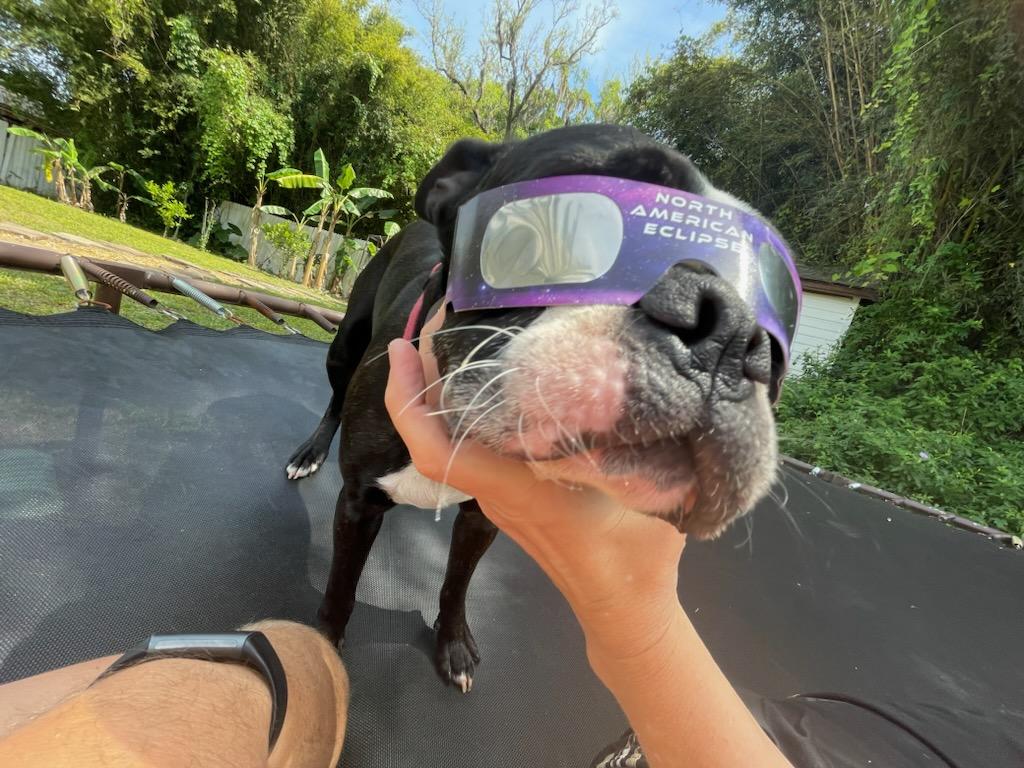Exploring the Effects of Solar Eclipses on Dogs: Behavior, Visible Signs, and Comfort
Solar eclipses, with their mesmerizing display of celestial alignment, often capture the attention and wonder of humans and animals alike. Among our beloved furry companions, dogs, there is a curiosity about whether these astronomical events have any noticeable impact on their behavior, health, or comfort.

While scientific research specifically focusing on the effects of solar eclipses on dogs is limited, anecdotal evidence and observations from pet owners shed some light on this topic. It is essential to approach this subject with a balanced perspective, understanding that dogs’ reactions may vary based on various factors, including their individual temperament and past experiences.
Behavioral Changes: During solar eclipses, dogs may experience a range of subtle behavioral changes that can offer insights into their reactions to this unique celestial event. One common behavioral change observed in dogs during solar eclipses is increased restlessness. This restlessness may manifest as pacing, frequent shifting of positions, or difficulty settling down in one place. Dogs may seem more active than usual, seemingly trying to find a comfortable spot or seeking a sense of security.
Heightened alertness is another behavioral change that dogs may display during solar eclipses. They may appear more vigilant, with heightened awareness of their surroundings. This heightened alertness could be a response to the changes in natural light levels or the unusual atmospheric conditions that accompany a solar eclipse. Dogs’ acute senses may also contribute to this heightened awareness as they pick up on subtle changes in their environment.
Seeking reassurance and comfort from their owners is a common behavior observed in dogs during stressful or unfamiliar situations, including solar eclipses. Dogs may seek physical contact, such as leaning against their owners, sitting close to them, or even seeking lap time. This behavior reflects their natural instinct to seek safety and security from their human companions, especially during times of uncertainty or perceived danger.
These behavioral changes are often transient, meaning they occur temporarily during the duration of the solar eclipse and may gradually diminish as the event passes. Dogs’ ability to adapt to changing environments and their reliance on familiar cues, such as their owners’ presence and reassurance, can influence how they navigate through these temporary changes in behavior.
It’s essential for pet owners to observe and understand these subtle behavioral changes in their dogs during solar eclipses. Providing a calm and reassuring environment, maintaining a familiar routine, and offering comforting gestures such as gentle petting or soothing words can help alleviate any stress or anxiety that dogs may experience during these celestial events.
Overall, while the behavioral changes in dogs during solar eclipses are transient and relatively minor, they offer valuable insights into how our canine companions perceive and respond to the natural world around them. By being attuned to their needs and providing support when needed, pet owners can ensure that their dogs feel safe, secure, and comfortable during these captivating astronomical occurrences.
Visible Signs of Distress: While dogs may not exhibit direct signs of distress specifically caused by the solar eclipse, they may display general signs of anxiety or stress during these celestial events. These signs of distress can serve as indicators of how dogs perceive and react to changes in their environment, including variations in natural light and atmospheric conditions.
One common visible sign of distress in dogs during solar eclipses is panting. Panting can occur as a result of increased stress or anxiety, as dogs may struggle to regulate their body temperature effectively during moments of heightened arousal. Additionally, dogs may exhibit pacing behavior, characterized by continuous movement back and forth, which can indicate restlessness or discomfort.
Whining is another visible sign that dogs may display during solar eclipses. This vocalization can serve as a communication of distress or unease, expressing their emotional state in response to the unfamiliarity of the eclipse event. Dogs may also engage in hiding behavior, seeking refuge in enclosed spaces or under furniture as a means of seeking comfort and security during periods of heightened anxiety.
Seeking close contact with their owners is a common response seen in dogs experiencing stress or anxiety during solar eclipses. Dogs may lean against their owners, seek physical proximity, or exhibit clingy behavior, seeking reassurance and comfort in the familiar presence of their human companions.
It’s crucial for pet owners to be attentive to these visible signs of distress in their dogs during solar eclipses. Recognizing these cues allows owners to respond appropriately by providing a calm and reassuring environment, offering gentle reassurance, and avoiding exposure to additional stressors that may exacerbate their dogs’ anxiety.
Creating a quiet and secure space for dogs to retreat to, providing comforting gestures such as gentle petting or soothing words, and maintaining a sense of normalcy in their routine can help alleviate their stress and promote a sense of calmness during these celestial events.
By understanding and responding to the visible signs of distress in dogs during solar eclipses, pet owners can ensure that their furry companions feel safe, supported, and comfortable throughout these captivating astronomical occurrences.
Comfort and Security: Dogs, much like humans, thrive in environments where they feel safe, secure, and surrounded by familiar comforts. During solar eclipses or any other unusual event that may cause stress or anxiety, it’s essential for pet owners to create a supportive environment that promotes their dogs’ well-being.
One effective way to alleviate potential stress or discomfort in dogs during solar eclipses is to provide familiar comforts. This can include their favorite toys, blankets, or bedding, which can offer a sense of familiarity and security. Dogs often find comfort in objects that carry their scent or remind them of positive experiences, helping to reduce their anxiety levels.
Additionally, creating a quiet and calm space for dogs to retreat to can be beneficial during solar eclipses. This space should be free from loud noises, bright lights, or other potential stressors associated with the eclipse event. Providing a safe haven allows dogs to relax and feel protected, minimizing their exposure to external stimuli that may trigger anxiety.
Maintaining a consistent routine during solar eclipses can also contribute to dogs’ sense of security. Dogs thrive on predictability and structure, so sticking to their regular feeding schedule, exercise routine, and bedtime rituals can help them feel more at ease during times of change or disruption.
Furthermore, offering soothing gestures such as gentle petting, soft words of reassurance, or calming music can help dogs relax and feel comforted during solar eclipses. These gestures can reinforce the bond between dogs and their owners, providing emotional support and stability during potentially stressful events.
By prioritizing their dogs’ comfort and well-being, pet owners can help them navigate solar eclipses and other unusual events with greater ease and resilience. Creating a supportive environment, providing familiar comforts, and offering gentle reassurance are essential strategies for helping dogs feel safe, secure, and cared for during these captivating astronomical occurrences.
It’s crucial to note that dogs’ responses to solar eclipses may also be influenced by the reactions of those around them, including their owners’ demeanor and level of reassurance. Maintaining a calm and composed demeanor, offering gentle reassurance, and avoiding unnecessary exposure to stressful situations can contribute to a positive experience for dogs during such celestial events.
In conclusion, while the direct effects of solar eclipses on dogs may not be well-defined, being mindful of their comfort, observing any behavioral changes, and providing a supportive environment can contribute to their well-being during these captivating astronomical occurrences.






